- Investor Talk Daily
- Posts
- RFK Jr. Named HHS Secretary
RFK Jr. Named HHS Secretary
Retail Growth Surges as Tariff Threat Looms and Japan GDP Grows 0.3% in Q3
POLITICS
RFK Jr. Named HHS Secretary
President-elect Donald Trump has nominated Robert F. Kennedy Jr., a longtime vaccine skeptic, to lead the Department of Health and Human Services (HHS). The decision places Kennedy, an attorney known for his activism against pharmaceutical companies and pesticides, in charge of a vast agency overseeing drug safety, medical research, and programs like Medicare and Medicaid.
Trump announced the appointment on Truth Social, declaring Kennedy would “Make America Great and Healthy Again.” A former Democratic presidential candidate turned independent, Kennedy dropped his bid and endorsed Trump after negotiating a health policy role in the administration.
Kennedy’s controversial views, including claims linking vaccines to autism and advocating for fluoride removal from drinking water, have drawn criticism from both parties. His nonprofit, Children’s Health Defense, has also filed lawsuits against media organizations over misinformation policies.
While Kennedy’s nomination energizes his supporters, it raises questions about his confirmation in a GOP-controlled Senate.
Source

FINANCE
Retail Growth Surges as Tariff Threat Looms
China’s stimulus boosts domestic consumption as Trump tariffs loom. China’s economy showed signs of rebounding as retail sales hit an eight-month high in October, while industrial production remained steady. This progress could be crucial if President-elect Donald Trump’s return to the White House prompts new tariffs on Chinese goods. The government’s efforts to stimulate domestic demand, including subsidizing consumer purchases, have helped offset the previous imbalance where production outpaced household spending. Retail sales rose 4.8% in October, surpassing expectations, and industrial output increased by 5.3%.
China’s leaders are facing growing pressure to support consumption, especially after Trump’s reelection and his tariff threats. Beijing has ramped up fiscal policies, including subsidies for home appliances and vehicles. Analysts suggest that unlocking household savings and boosting domestic spending may be China’s best strategy to weather potential economic disruptions. However, challenges remain, including deflationary risks and weak demand, requiring continued government intervention to maintain growth momentum.
Source
FINANCE
Japan GDP Grows 0.3% in Q3
Japan's GDP grew by 0.3% in the third quarter year-on-year, ending two consecutive quarters of declines. On a quarter-on-quarter basis, GDP rose by 0.2%, with an annualized expansion of 0.9%. This marked a recovery from the 1.1% decline in the previous quarter. The data comes after the Bank of Japan raised interest rates from 0.1% to 0.25% in July, the highest level since 2008. While higher rates typically cool economic activity, the BOJ has signaled it may raise them further if economic conditions continue to improve, potentially reaching 1% by the second half of 2025.
Despite the growth, capital spending fell, and consumer recovery remained sluggish, according to Keio University professor Sayuri Shirai. Following the data, Japan's stock markets rose, with the Nikkei 225 up by 1.28%. The yen weakened slightly against the U.S. dollar, continuing its volatile fluctuations amid concerns over excessive speculation.
Source
Word of the day
Inchoate
Inchoate means just beginning to form. You can have an inchoate idea, like the earliest flickers of images for your masterpiece, or an inchoate feeling, like your inchoate sense of annoyance toward your sister's new talking parrot.
DISCLAIMER: None of this is financial advice. This newsletter is strictly educational and is not investment advice or a solicitation to buy or sell any assets or to make any financial decisions. Please be careful and do your own research.